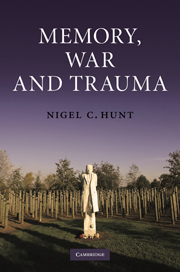Book contents
- Frontmatter
- Contents
- Preface
- 1 Background and purpose
- 2 Historical perspective
- 3 Methods and ethics
- 4 Current theory: post-traumatic stress disorder
- 5 Approaches to understanding trauma
- 6 Positive outcomes of traumatic experiences
- 7 Memory and history
- 8 Personal narrative and social discourse
- 9 Illustrating narrative as a scientific technique: the role of social support
- 10 Ageing, trauma and memory
- 11 Literature and trauma
- 12 Memorialisation and commemoration
- 13 Battlefield tours
- 14 Conclusions and future directions
- References
- Index
14 - Conclusions and future directions
Published online by Cambridge University Press: 05 June 2012
- Frontmatter
- Contents
- Preface
- 1 Background and purpose
- 2 Historical perspective
- 3 Methods and ethics
- 4 Current theory: post-traumatic stress disorder
- 5 Approaches to understanding trauma
- 6 Positive outcomes of traumatic experiences
- 7 Memory and history
- 8 Personal narrative and social discourse
- 9 Illustrating narrative as a scientific technique: the role of social support
- 10 Ageing, trauma and memory
- 11 Literature and trauma
- 12 Memorialisation and commemoration
- 13 Battlefield tours
- 14 Conclusions and future directions
- References
- Index
Summary
This brief chapter draws together the material that has been examined through the book, identifies some key themes relating to memory, war and trauma, and proposes a framework for future research. In the end the purpose of research in this field has to be helping those who have suffered psychologically due to war or other traumatic events. This book has not looked at psychological therapies in any detail, because that has not been the purpose of the book, but it is hoped that clinicians and therapists will find valuable lessons for therapeutic practice within these pages. We do now understand a great deal about war and the psychological impact war can have on people. The introduction of PTSD in 1980 provided a useful impetus for research, and there are now well over 20,000 academic papers published on this topic. While they do, of course, vary in quality, overall it has meant that we have a much better grasp of the key issues surrounding war trauma.
What have we learned?
This book has demonstrated, I hope, that a good understanding of memory, war and trauma requires more than psychological research. War is a topic that affects most people in one way or another, whether as active participants, a family member of someone in the armed forces, students of history or someone exposed to the media.
- Type
- Chapter
- Information
- Memory, War and Trauma , pp. 196 - 205Publisher: Cambridge University PressPrint publication year: 2010



